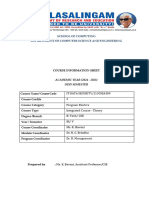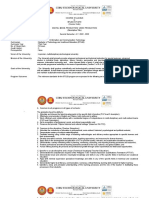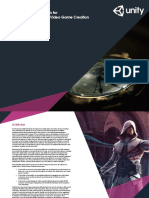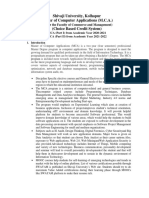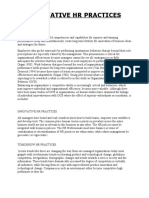(BS-IEMC) Program Specification
(BS-IEMC) Program Specification
Uploaded by
ADonutReadingCopyright:
Available Formats
(BS-IEMC) Program Specification
(BS-IEMC) Program Specification
Uploaded by
ADonutReadingOriginal Title
Copyright
Available Formats
Share this document
Did you find this document useful?
Is this content inappropriate?
Copyright:
Available Formats
(BS-IEMC) Program Specification
(BS-IEMC) Program Specification
Uploaded by
ADonutReadingCopyright:
Available Formats
De La Salle-College of Saint Benilde
Bachelor of Science in Interactive Entertainment and Multimedia Computing
Program Specification
Awarding Institution De La Salle-College of Saint Benilde
School School of Management and Information Technology
Program Accreditation Commission on Higher Education (CHED) Government Recognition No. 013,
Series of 2015.
Name of Final Award Bachelor of Science in Interactive Entertainment and Multimedia Computing
major in Game Development and major in Game Art (BS-IEMC)
Program Title Bachelor of Science in Interactive Entertainment and Multimedia Computing
major in Game Development and major in Game Art (BS-IEMC)
Description of the Program The Bachelor of Science in Interactive Entertainment and Multimedia
Computing Program is a discipline that covers that totality of the ideation,
the design, the art, the technical implementation, the manage and the business
of Interactive Software Projects geared towards entertainment, simulations
and solutions through the use of Video Game Technologies and Tools.
The Game Development Track focuses on the technical aspect of Video
Game Creation. Focused on heavy foundational development on computer
programming and the use of industry grade game engine software to develop
various video game projects geared towards different platforms from covering
PC, Mobile, Virtual Reality and Augmented Reality.
The Game Art Track focuses on the aesthetic (visual) aspect of Video Game
Creation. Focused heavily on the development of various visual assets used
in video games, through the use of industry grade tools to develop 2D Art,
Pixel Art, 3D Assets, Textures and Special FX that can be seen and experienced
through a Video Game.
School of Management and Information Technology
2544 Taft Avenue, Manila, Philippines 1004 +63 2 8230-5100 loc. 1709 www.benilde.edu.ph
Expected Program Learning Upon completion of the BACHELOR OF SCIENCE IN INTERACTIVE
Outcomes ENTERTAINMENT AND MULTIMEDIA COMPUTING, students are expected to:
• PO1. Apply game design concepts and mechanics through the use of art,
methods, and processes to create interactive applications.
• PO2. Create interactive entertainment applications and / or assets to meet
target player expectations using development tools.
• PO3. Execute a game development project effectively and efficiently
to optimize the production process by applying guided project management
tools while adapting professional, ethical and legal best practices.
Admission Requirements All students must pass the Benildean Entrance Exam (BEE). The information
regarding application, admission timetable, and application results may be
viewed at Benilde Admissions Center. Downloadable forms and school
brochures are available from this site.
Applicants applying to any degree or non-degree program offered by
DLS-CSB are expected to provide a complete medical disclosure of past
or present conditions that may have an effect on student learning
and their intention to be a member of the Benildean community.
As an additional requirement for the program, all applicants will be required
to undergo an interview process with senior faculty members of the BSIEMC
and take a “grit test”.
Program Overview The Program consists of 196.5 units distributed as follows:
Units
CHED GE Mandated Courses 53
DLS-CSB Institutional Courses 19
Common Computing Courses 19.5
IEMC Common Core Courses 27
IEMC Professional Courses 27
GDD Professional Courses 24
Free Electives 9
Capstone Project 9
Practicum 9
School of Management and Information Technology
2544 Taft Avenue, Manila, Philippines 1004 +63 2 8230-5100 loc. 1709 www.benilde.edu.ph
Curriculum and Program The curriculum and program structure are outlined in the program checklist.
Structure The curriculum map shows the alignment between the courses in the program
and the program goals.
Teaching and Learning DLS-CSB espouses and promotes learner-centered parameters. A balance
Strategy, Assessment of theory and practice is achieved through lecture courses combined with
laboratory courses/sessions and application sites such as the teaching hotel,
training restaurants and training travel agency unit.
Various assessment strategies are used such as class discussion, written and
oral examinations, return demonstration, journal submission, reflective essay,
assignment, seatwork, case study analysis, portfolio submission, final project
and individual/group report.
Date of Revision AY 2018-2019
School of Management and Information Technology
2544 Taft Avenue, Manila, Philippines 1004 +63 2 8230-5100 loc. 1709 www.benilde.edu.ph
PROGRAM CHECKLIST
Game Development Track
Term 1
Course Code Course Title Units Pre-requisite Co-requisite
BIBCHUR Bible and Church 3
ARTAPRI Art Appreciation 3
FUNCOM1 Computer Fundamentals 1 3
UNDSELF Understanding the Self 3
MATWRLD Mathematics in the Modern World 3
ITETHICS Critical and Creative Thinking 3
PEONEPF Physical Fitness 2
CSBLIFE College of Saint Benilde Student Life (3)
Term 2
Course Code Course Title Units Pre-requisite Co-requisite
PURPCOM Purposive Communication 3
INTEFIL Interaktibong Filipino sa Multidisiplinaryong 3
Larangan
GAMDRAW Freehand and Digital Drawing 3
FUNCOM2 Computer Fundamentals 2 3
BASPRG1 Basic Programming 1 4.5
SCITECH Science Technology and Society 3
PETWODA Dance 2 PEONEPF
NSTP-01 National Service Training Program 1 (3)
Term 3
Course Code Course Title Units Pre-requisite Co-requisite
REEXSPI Religious Experience and Spirituality 3
STSCRPT Storyboarding and Scriptwriting for Games 3
GM2DBAS Principles of 2D Animation for Game Developers 3 GAMDRAW
GDEVDAT Databases for Game Developers 3
BASPRG2 Basic Programming 2 3 BASPRG1
APLTRIG Applied Trigonometry for Game Developers 3
PEFORTS Team Sports 2 PETWODA
NSTP-02 National Service Training Program 2 (3) NSTP-01
School of Management and Information Technology
2544 Taft Avenue, Manila, Philippines 1004 +63 2 8230-5100 loc. 1709 www.benilde.edu.ph
Term 4
Course Code Course Title Units Pre-requisite Co-requisite
CRITHNK Critical and Creative Thinking 3
GDSTRUC Data Structures and Algorithm 3 BASPRG1
GM3DBAS Principles of 3D Animation for Game Developers 3
GAMSTDY Introduction to Game Design and Development 3
BASPRG3 Basic Programming 3 3 BASPRG2
AUDSOND Audio and Sound Design 3
PETRIID Team Sports Individual / Dual Sports 2 PEFORTS
Term 5
Course Code Course Title Units Pre-requisite Co-requisite
FILDISI Filipino sa Iba’t Ibang Disiplina 3
GDEVMAT Game Development Math 3
ANDGPRG Android Game Programming 3
GAMMECH Game Mechanics 3 GAMSTDY
GRAPROG Advanced Graphics Programming 3 BASPRG3
GMELEC1 GDD Elective 1 3
CONWORL Contemporary World 3
Term 6
Course Code Course Title Units Pre-requisite Co-requisite
WORLMYT World Mythology 3
GMDEVAI Artificial Intelligence in Games 3
IOSGPRG IOS Game Programming 3
USEREXP User Interfaces and User Experience 3 GAMMECH
GDEVPHY Game Development Physics 3
GAMPRG1 Game Programming 1 3 BASPRG2
School of Management and Information Technology
2544 Taft Avenue, Manila, Philippines 1004 +63 2 8230-5100 loc. 1709 www.benilde.edu.ph
Term 7
Course Code Course Title Units Pre-requisite Co-requisite
WORLMYT World Mythology 3
GCMPREN Compositing and Rendering 3
TEXTMAP Texture Mapping 3
USEREXP User Interfaces and User Experience 3 USEREXP
GM3DADV Advanced 3D for Game Developers 3
LIGHTFX Lighting and Effects 3 GAMPRG1
Term 8
Course Code Course Title Units Pre-requisite Co-requisite
MARFAMI Marriage and Family Life 3
GMELEC2 GDD Elective 2 3 DESPROC
GAMPROD Game Production 3
JORIZAL Life and Works of Rizal 3 GAMPRG1,
DESPROC
CAPSTN1 Capstone Project 1 3 GAMPRG2
GAMPRG3 Game Programming 3 3
Term 9
Course Code Course Title Units Pre-requisite Co-requisite
GMETHIC Ethical Issues and Leadership in the Game 3
Industry
GMELEC3 GDD Elective 3 3 GAMPROD
QASSURE Quality Assurance for Games 3
GAMEBIZ Game Business Entrepreneurship 3 CAPSTN1
CAPSTN2 Capstone Project 2 3
READHIS Readings in Philippine History 3 CSBLIFE
CSBGRAD College of Saint Benilde Graduating Students (1)
Term 10
Course Code Course Title Units Pre-requisite Co-requisite
GMPRACT On-the Job Training 9
CAPSTN3 Capstone Project 3 3 CAPSTN2
School of Management and Information Technology
2544 Taft Avenue, Manila, Philippines 1004 +63 2 8230-5100 loc. 1709 www.benilde.edu.ph
PROGRAM CHECKLIST
Game Art Track
Term 1
Course Code Course Title Units Pre-requisite Co-requisite
BIBCHUR Bible and Church 3
ARTAPRI Art Appreciation 3
UNDSELF Understanding the Self 3
FUNCOM1 Computer Fundamentals 1 3
IETHICS Ethics 3
MATWRLD Mathematics in the Modern World 3
PEONEPF Physical Fitness 2
CSBLIFE College of Saint Benilde Student Life (3)
Term 2
Course Code Course Title Units Pre-requisite Co-requisite
PURPCOM Purposive Communication 3
INTEFIL Interaktibong Filipino sa Multidisiplinaryong 3
Larangan
GAMDRAW Freehand and Digital Drawing 3
FUNCOM2 Computer Fundamentals 2 3
BASPRG1 Basic Programming 2 4.5
SCITECH Science Technology and Society 3
PETWODA Dance 2 PEONEPF
NSTP-01 National Training Service Program 1 (3)
Term 3
Course Code Course Title Units Pre-requisite Co-requisite
REEXSPI Religious Experience and Spirituality 3
STSCRPT Storyboarding and Scriptwriting for Games 3
GM2DBAS Principles of 2D Animation for game Developers 3 GAMDRAW
GDEVDAT Databases for Game Developers 3
BASPRG2 Basic Programming 2 3 BASPRG1
APLTRIG Applied Trigonometry for Game Developers 3
PEFORTS Team Sports 2 PETWODA
NSTP-02 National Service Training Program 2 (3) NSTP-01
School of Management and Information Technology
2544 Taft Avenue, Manila, Philippines 1004 +63 2 8230-5100 loc. 1709 www.benilde.edu.ph
Term 4
Course Code Course Title Units Pre-requisite Co-requisite
CRITHNK Critical and Creative Thinking 3
GDSTRUC Data Structures and Algorithms 3 BASPRG1
GM3DBAS Principles of 3D Animation for Game Developers 3
GAMSTDY Introduction to the Game Design 3
and Development
BASPRG3 Basic Programming 3 3 BASPRG2
AUDSOND Audio and Sound Design 3
PETRIID Team Sports Individual / Dual Sports 2 PEFORTS
Term 5
Course Code Course Title Units Pre-requisite Co-requisite
FILDISI Filipino sa Iba’t Ibang Disiplina 3
IMGPROC Image and Video Processing 3
DIGIDRW Advanced Topics on Digital Drawing 3
GAMMECH Game Mechanics 3 GAMSTDY
GM2DADV Advanced 2D for Game Developers 3
GMELEC1 Game Elective 1 3
CONWORL Contemporary World 3
Term 6
Course Code Course Title Units Pre-requisite Co-requisite
WORLMYT World Mythology 3
GCMPREN Compositing and Rendering 3
TEXTMAP Texture Mapping 3
USEREXP User Interfaces and User Experience 3 GAMMECH
GM3DADV Advanced 3D for Game Developers 3
LIGHTFX Lighting and Effects 3
School of Management and Information Technology
2544 Taft Avenue, Manila, Philippines 1004 +63 2 8230-5100 loc. 1709 www.benilde.edu.ph
Term 7
Course Code Course Title Units Pre-requisite Co-requisite
ASEANST ASEAN Studies 3
CONCART Concept Art 3
DESPROC Design and Production Process 3 GAMSTDY
LEVLART Level Art 3 USEREXP
MODLRIG Modelling and Rigging 3
ADSOUND Advanced Sound Production 3 ADSOUND
Term 8
Course Code Course Title Units Pre-requisite Co-requisite
MARFAMI Marriage and Family Life 3
GMELEC2 GDD Elective 2 3
ANIPROD Animation and Design Production 3 DESPROC
JORIZAL Life and Works of Rizal 3
CAPSTN1 Capstone Project 1 3 DESPROC
SCULPTZ Digital Sculpting 3
Term 9
Course Code Course Title Units Pre-requisite Co-requisite
GMETHIC Ethical Issues and Leadership in the Game 3
Industry
GMELEC3 Game Elective 3 3 ANIPROD
QASSURE Quality Assurance for Games 3
GAMEBIZ Game Business 3 GM3DADV,
CAPSTN2 Capstone Project 2 3 CAPSTN1
READHIS Readings in the Philippine History 3
CSBGRAD College of Saint Benilde Graduating Students (1) CSBLIFE
Term 10
Course Code Course Title Units Pre-requisite Co-requisite
GMPRACT On-the-Job Training 9
CASPTN3 Capstone Project 3 3 CAPSTN2
School of Management and Information Technology
2544 Taft Avenue, Manila, Philippines 1004 +63 2 8230-5100 loc. 1709 www.benilde.edu.ph
ELECTIVES
Course Code Course Title Units Pre-requisite Co-requisite
ADVCART Advance Concept Art 3
GAMEENG Game Engine Programming 3
AZCULPT Human Anatomy Digital Sculpting 3
GAMANAT Advanced Anatomy 3
SHADEFX Shader Effects in Unreal and Unity 3
STYLVFX Stylized Visual Effects 3
GDSYNTH Game Design Synthesis 3
School of Management and Information Technology
2544 Taft Avenue, Manila, Philippines 1004 +63 2 8230-5100 loc. 1709 www.benilde.edu.ph
CURRICULUM MAP
Bachelor of Science in Interactive Entertainment and Multimedia Computing
Common Computing Courses PO1 PO2 PO3
1 Computer Fundamentals 1
2 Computer Fundamentals 2
3 Basic Programming 1
4 Basic Programming 2
5 Databases for Game Developers
6 Data Structures and Algorithms
IEMC Common Core Courses PO1 PO2 PO3
1 Freehand and Digital Drawing
2 Principles of 2D Animation for Game Developers
3 Storyboarding and Scriptwriting for Games
4 Principles of 3D Animation for Game Developers
5 Introduction to Game Design and Development
6 Basic Programming 3
7 Audio and Sound Design
8 User Interfaces and User Experience
9 Design and Production Process
IEMC-Game Dev Professional Courses PO1 PO2 PO3
1 Game Development Math
2 Game Mechanics
3 Artificial Intelligence in Games
4 Game Development Physics
5 Game Programming 1
6 Game Programming 2
7 Game Programming 3
8 Advanced Game Networking
9 Game Production
IEMC-Game Art Professional Courses PO1 PO2 PO3
1 Image and Video Processing
2 Advanced 2D for Game Developers
3 Compositing and Rendering
School of Management and Information Technology
2544 Taft Avenue, Manila, Philippines 1004 +63 2 8230-5100 loc. 1709 www.benilde.edu.ph
4 Advanced 3D for Game Developers
5 Texture Mapping
6 Lighting and Effects
7 Modeling and Rigging
8 Advanced Sound Production
9 Animation and Design Production
GDD-Game Dev Professional Courses PO1 PO2 PO3
1 Android Game Programming
2 IOS Game Programming
3 Advanced Graphics Programming
4 Web Game Programming
5 Level Design
6 Ethical Issues and Leadership in the Game Industry
7 Quality Assurance for Games
8 Game Business Entrepreneurship
GDD-Game Art Professional Courses PO1 PO2 PO3
1 Advanced Topics on Digital Drawing
2 Game Mechanics
3 Concept Art
4 Level Art
5 Digital Sculpting
6 Ethical Issues and Leadership in the Game Industry
7 Quality Assurance for Games
8 Game Business Entrepreneurship
Capstone and Practicum PO1 PO2 PO3
1 Capstone Project 1
2 Capstone Project 1
3 Capstone Project 1
4 On-the-job Training
School of Management and Information Technology
2544 Taft Avenue, Manila, Philippines 1004 +63 2 8230-5100 loc. 1709 www.benilde.edu.ph
Elective Courses PO1 PO2 PO3
Programming Elective
1 Game Engine
2 Shader Effects in Unreal and Unity
Art Elective
1 Advance Concept Art
2 Human anatomy Digital Sculpting
3 Advanced Anatomy
4 Stylized Visual Effects
Design Elective
1 Game Design Synthesis
School of Management and Information Technology
2544 Taft Avenue, Manila, Philippines 1004 +63 2 8230-5100 loc. 1709 www.benilde.edu.ph
You might also like
- Project ProposalDocument8 pagesProject ProposalLynette Castilar100% (1)
- BCA New SyllabusDocument173 pagesBCA New Syllabusjoeltomy456No ratings yet
- Bca SyllabusDocument173 pagesBca Syllabussankalp.vipsNo ratings yet
- Senior High School CoursesDocument2 pagesSenior High School CoursesMary Charisse SandroNo ratings yet
- SyllabusDocument203 pagesSyllabuspiyushjharotiya00No ratings yet
- (BS-IS) Program Specification v2Document8 pages(BS-IS) Program Specification v2ADonutReadingNo ratings yet
- Bachelor of Computer Applications: Proposed Scheme of SyllabusDocument78 pagesBachelor of Computer Applications: Proposed Scheme of SyllabusAatifNo ratings yet
- BCA 3 Years 2025Document118 pagesBCA 3 Years 2025mani kumarNo ratings yet
- PCIT 03 Syllabi 2020 21 1stDocument11 pagesPCIT 03 Syllabi 2020 21 1stmarksalaoNo ratings yet
- Computer Games (Art and Animation) 3D Computer Animation: BA/BA (Hons)Document2 pagesComputer Games (Art and Animation) 3D Computer Animation: BA/BA (Hons)mohammedNo ratings yet
- 213cse4309 - It Data Security Course PlanDocument15 pages213cse4309 - It Data Security Course PlanKamatchi KartheebanNo ratings yet
- Republic of The Philippines Nueva Vizcaya State University Bambang, Nueva VizcayaDocument11 pagesRepublic of The Philippines Nueva Vizcaya State University Bambang, Nueva VizcayaHonora Fe DolorNo ratings yet
- LecturePlan AN301 23ANP-606Document5 pagesLecturePlan AN301 23ANP-606kushwahag14No ratings yet
- Game DevelopmentDocument13 pagesGame Developmentjenjerome.delapenaNo ratings yet
- Master of Fine Arts in Digital Cinema Production: Learn More TodayDocument4 pagesMaster of Fine Arts in Digital Cinema Production: Learn More TodayBlazing BooksNo ratings yet
- AY 2022 2023 BSIT Course Syllabus NC DCIT 22 Computer Programming IDocument12 pagesAY 2022 2023 BSIT Course Syllabus NC DCIT 22 Computer Programming IJenjie Villaseñor Dela PeñaNo ratings yet
- R. Gimarino BTLED-ICT 3210 (DMP) Video Production SyllabusDocument9 pagesR. Gimarino BTLED-ICT 3210 (DMP) Video Production SyllabusRyan GimarinoNo ratings yet
- Mini Project - Report DonutDocument33 pagesMini Project - Report DonutvirajjadhaocompNo ratings yet
- Software Engineering (New)Document10 pagesSoftware Engineering (New)Tamiru Dereje100% (1)
- (AB-ANI) Program SpecificationDocument8 pages(AB-ANI) Program SpecificationMycah EvangelistaNo ratings yet
- Css tgj4m GR 12 Video Production Course Outline Fall 2021Document4 pagesCss tgj4m GR 12 Video Production Course Outline Fall 2021api-308067286100% (1)
- Group-2 Technical-Writing T63Document16 pagesGroup-2 Technical-Writing T63johnnyboyvsualsNo ratings yet
- LecturePlan CS201 21CSH-319Document6 pagesLecturePlan CS201 21CSH-319Shivam Kumar MishraNo ratings yet
- OBE BCA 2023 Batch SyllabusDocument348 pagesOBE BCA 2023 Batch Syllabuspinkyjaiswal7890No ratings yet
- SMU SCIS Brochure 2023Document9 pagesSMU SCIS Brochure 2023djmishra337No ratings yet
- STM Lab Manual - DRKDocument69 pagesSTM Lab Manual - DRKkeerthanashree02No ratings yet
- IoT Lab Manual IT 705 Internet of ThingsDocument111 pagesIoT Lab Manual IT 705 Internet of Thingsshrivastavasachin090No ratings yet
- C 20 GA Sem1&sem2Document153 pagesC 20 GA Sem1&sem2fecapoc679No ratings yet
- Mobile Application and Design 1 SyllabusDocument10 pagesMobile Application and Design 1 SyllabusAmber GreenNo ratings yet
- M.Sc. CS (5 Yrs)Document105 pagesM.Sc. CS (5 Yrs)Lokesh SivanandamNo ratings yet
- Advanced Mechanical Drawing SyllabusDocument10 pagesAdvanced Mechanical Drawing SyllabusSheen L.No ratings yet
- DCIT 22 Course SyllabusDocument12 pagesDCIT 22 Course SyllabusJenjie Villaseñor Dela PeñaNo ratings yet
- Curriculum Booklet CSE-Core 22-26Document319 pagesCurriculum Booklet CSE-Core 22-26Red AyeNo ratings yet
- Unity Educator Toolkit Professional Skills StandardDocument38 pagesUnity Educator Toolkit Professional Skills StandardCristi RusuNo ratings yet
- Bca 2021 SyllabusDocument120 pagesBca 2021 Syllabusvikas21014005No ratings yet
- Sadp Lab Manual PDFDocument38 pagesSadp Lab Manual PDFVasavi VasuNo ratings yet
- Programme Outline: Multimedia Design: Purpose 1Document31 pagesProgramme Outline: Multimedia Design: Purpose 1Ryan MalyonNo ratings yet
- Final DL - Manual 2020-21Document87 pagesFinal DL - Manual 2020-21Madhukar NimbalkarNo ratings yet
- LecturePlan TOCDocument11 pagesLecturePlan TOCVanshika KaulNo ratings yet
- BTEC First ICT Delivery GuideDocument184 pagesBTEC First ICT Delivery GuideRoberto PiresNo ratings yet
- Syllabus (Software Engineering)Document6 pagesSyllabus (Software Engineering)deb galangNo ratings yet
- Digital Audiovisual Media ProductionDocument40 pagesDigital Audiovisual Media ProductionScribdTranslationsNo ratings yet
- B.SC (AM) 20212608Document116 pagesB.SC (AM) 20212608Renz Diego AngelesNo ratings yet
- Engineering Graphics Note Book For The A.Y. 2022-23Document66 pagesEngineering Graphics Note Book For The A.Y. 2022-2321WH1A0578 PENUMATHSA LIKHITA VARMANo ratings yet
- Interactive BrochureDocument30 pagesInteractive BrochureMargaret DimaalaNo ratings yet
- BCA Syllabus 2020Document110 pagesBCA Syllabus 2020vikas21014005No ratings yet
- Sindh Hec NoticeDocument1 pageSindh Hec Noticeuzain9937No ratings yet
- HOSP104 - Course SyllabusDocument9 pagesHOSP104 - Course SyllabusRico CombinidoNo ratings yet
- MCA - Part I - 2020-21Document37 pagesMCA - Part I - 2020-21Sunil PatilNo ratings yet
- Ajp IntroDocument22 pagesAjp IntroshubhamNo ratings yet
- LecturePlan CS201 21CSH-422Document7 pagesLecturePlan CS201 21CSH-422Tanishq MittalNo ratings yet
- December 9-13, 2019 DLLDocument10 pagesDecember 9-13, 2019 DLLRonald V. VentayenNo ratings yet
- LecturePlan CS201 21CSH-355Document7 pagesLecturePlan CS201 21CSH-355JATIN MOHANNo ratings yet
- OBE Syllabus - SADDocument13 pagesOBE Syllabus - SADZeroCodeNo ratings yet
- Sinhgad Institute of Technology & Science, PuneDocument15 pagesSinhgad Institute of Technology & Science, PuneSmita BhosaleNo ratings yet
- LecturePlan AN301 23ANP-611Document5 pagesLecturePlan AN301 23ANP-611kushwahag14No ratings yet
- Product Design: Bachelor of Design: Description Credit For Previous LearningDocument3 pagesProduct Design: Bachelor of Design: Description Credit For Previous Learningsujal patelNo ratings yet
- Cse R18 Iii-I Se Lab Instruction ManualDocument88 pagesCse R18 Iii-I Se Lab Instruction ManualsadweepNo ratings yet
- Computer Programming Syllabus 2Document9 pagesComputer Programming Syllabus 2Amber GreenNo ratings yet
- LecturePlan BI521 22CSH-345Document6 pagesLecturePlan BI521 22CSH-345Abhinav NirwalNo ratings yet
- Brochure - Next Generation Rotary Screw Compressors RS-Series 11-22 KW (I & N) PDFDocument2 pagesBrochure - Next Generation Rotary Screw Compressors RS-Series 11-22 KW (I & N) PDFdononoNo ratings yet
- Machine Learning in Auditing: Current and Future ApplicationsDocument7 pagesMachine Learning in Auditing: Current and Future ApplicationsGodfrey MakurumureNo ratings yet
- Innovative HR PracticesDocument5 pagesInnovative HR PracticespreyanshitNo ratings yet
- Slaa 089 FDocument2 pagesSlaa 089 FI lensesNo ratings yet
- For State Wise HuddleDocument19 pagesFor State Wise HuddleRajesh KhannaNo ratings yet
- Peter Behrens's AEG Turbine FactoryDocument4 pagesPeter Behrens's AEG Turbine Factorytito lopezNo ratings yet
- The Total Number of Hours A Senior High School Student of Swiss Montessori School Spent A Day On Social MediaDocument41 pagesThe Total Number of Hours A Senior High School Student of Swiss Montessori School Spent A Day On Social MediaJennel BaldozNo ratings yet
- LTE System OverviewDocument111 pagesLTE System OverviewKalkidan HailuNo ratings yet
- PB-1 CS Jaipur RegionDocument7 pagesPB-1 CS Jaipur RegionMd IshaanNo ratings yet
- Solar Energy - PV System Components - Weeks 6 - 7Document58 pagesSolar Energy - PV System Components - Weeks 6 - 7YAZEED ALMYHOBIENo ratings yet
- Mil Q2 Mod1Document6 pagesMil Q2 Mod1Floradel VergaraNo ratings yet
- Library System Thesis PhilippinesDocument8 pagesLibrary System Thesis Philippinesheidiowensspringfield100% (2)
- Slides For Chapter 18: Distributed Shared Memory: Distributed Systems: Concepts and DesignDocument16 pagesSlides For Chapter 18: Distributed Shared Memory: Distributed Systems: Concepts and DesignMooo PointNo ratings yet
- Canon Ir Advance 4045 Trouble Error Codes List: Downloaded From Manuals Search EngineDocument94 pagesCanon Ir Advance 4045 Trouble Error Codes List: Downloaded From Manuals Search EngineTengkuNo ratings yet
- H3C S7500X Switch Series DataSheetDocument11 pagesH3C S7500X Switch Series DataSheetGarak ZhangNo ratings yet
- Digital Signal Processing Assignment For Final - SolutionDocument6 pagesDigital Signal Processing Assignment For Final - SolutionMajid MehmoodNo ratings yet
- R20-N-Python Unit 3 - ChanduDocument44 pagesR20-N-Python Unit 3 - ChandumanasyogiNo ratings yet
- Dcs302ca61 Central ControllerDocument28 pagesDcs302ca61 Central ControllerCao Tâm VănNo ratings yet
- Laporan Projek Akhir POLITEKNIK (ELEKTRIK)Document86 pagesLaporan Projek Akhir POLITEKNIK (ELEKTRIK)saniy bin hj ahmad69% (13)
- BrowsersDocument20 pagesBrowsersmanaswi ojhaNo ratings yet
- Formranger - Limit Responses On A Google Form OptionDocument24 pagesFormranger - Limit Responses On A Google Form OptionGilnei ArnoNo ratings yet
- Catalog-All1-EN VALVE REXPOWERDocument97 pagesCatalog-All1-EN VALVE REXPOWERJhon RodriguezNo ratings yet
- Flyer OE-IE EN-R0Document4 pagesFlyer OE-IE EN-R0Vaso RoknicNo ratings yet
- Mostro - Special K - Unlimited LicenseDocument6 pagesMostro - Special K - Unlimited Licenseswagydevil0786No ratings yet
- 850 Purchase Order: ANSI ASC X12 Version 4010Document47 pages850 Purchase Order: ANSI ASC X12 Version 4010muddisetty umamaheswarNo ratings yet
- Checklist LM - Digitization - Project - Planning - GuideDocument8 pagesChecklist LM - Digitization - Project - Planning - Guiderajoumn9No ratings yet
- Insert Pump AnchorDocument2 pagesInsert Pump Anchorrolando100% (1)
- Strategic Management: Swot AnaylsisDocument15 pagesStrategic Management: Swot Anaylsisusman faisalNo ratings yet
- MANUAL 23D - 18D AisonDocument37 pagesMANUAL 23D - 18D Aisonعمر باعقيلNo ratings yet










